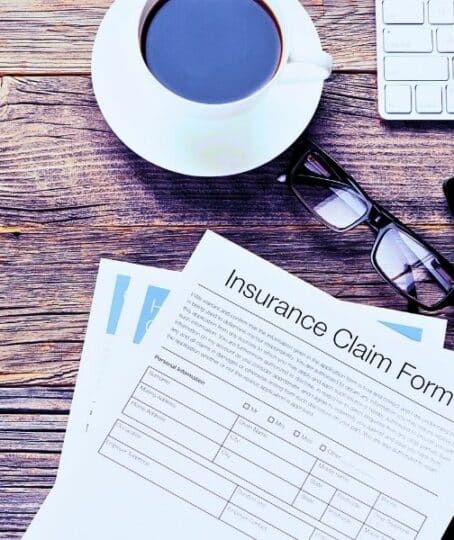
What to Do If You’re Injured in a Car Accident While Working in Illinois Work-related car accidents are common. Between...


Following a crash in which the other driver is at fault, you can file a third-party insurance claim with his or her auto insurance company. If you have the information of the at fault driver involved in the accident, you can contact his or her insurance company to file a claim. Some insurance companies also provide online claim reporting services. An insurance agent with your provider or a car accident lawyer may guide you through this process or provide you with more information.

A third-party insurance claim filed with the other driver's insurance carrier can compensate you for car repairs, medical bills, and other accident-related costs.
So, what is a third-party insurance claim? Third-party coverage is a type of insurance policy that protects you against claims made by someone who is not a party to your insurance agreement. If you accidentally cause injury or damage to someone's property, they may make a claim against you. Your third-party insurance will pay for the damages you're responsible for. Because third-party insurance covers you for any liability arising from your actions, it is also known as liability insurance.
The following three parties are involved in an insurance policy:
For example, a car might rear-end you at a traffic light, and you suffer injuries or damages. You can make a third-party claim for compensation even though you do not have a relationship with the other driver's insurance company or pay premiums to them. In this scenario, the other driver's insurance policy will cover your damages, and you will receive compensation for your accident-associated losses.
Insurance companies usually require you to report an accident within 24 to 48 hours. It's best to file a claim as soon as possible after the accident, ideally on the same day or within a few days.
However, in Illinois, the legal requirements require that you adhere to the statute of limitations. The statute of limitations on a lawsuit for car accident injuries is the same as that for all Illinois personal injury cases. As such, a lawsuit for an injury to a person should be filed within two years after the cause of action occurred. In other words, if you are injured in a vehicle crash as a driver, passenger, motorcyclist, bicyclist, electric scooter rider, or pedestrian, you must file your personal injury lawsuit within two years from the date of your accident.
If you are suing only to collect vehicle damages, the statute of limitations is five years from the date the collision occurred.
Evidence discovered at the site of an accident can play a crucial role in determining the cause of the crash. Some factors that are present at the scene may quickly disappear or become altered. Therefore, gathering the following information can be critical to your claim.
Accident scene photos and videos are crucial evidence. They can help determine who was at fault in an accident. The best practice is to take pictures immediately after the accident to document the scene, injuries, damages, and people involved.
Photographs of the accident scene can capture crucial details such as car positions and weather conditions like rain or snow, indicating if the driver was driving too fast for the conditions. Your pictures may include nearby traffic lights and stop signs, as they can help show the setting of the accident and traffic conditions at the time, especially if it occurred at an intersection or parking lot.
You should keep in mind how to document injuries after a car accident. One way is through photographs. Photographs of your injuries tie them to the accident and document the initial extent of your injuries suffered in the accident.
After a car accident, it is crucial to gather the names, addresses, and phone numbers of any witnesses present. Having witness statements can simplify the claims process. Witnesses can provide information about what they saw, heard, and the scene before, during, and after the accident. Witnesses may include drivers or passengers from the involved vehicles, pedestrians, nearby business employees or patrons, or motorists who were not involved but stopped to help. The details shared by witnesses can help create a story of what happened, determine who was at fault, and establish the parties involved, and how the accident occurred.
After a car accident, you should contact the police. They will generate a police report that contains significant details about the incident. The report might state the officer's opinion of who is responsible, any traffic violations given, eyewitness accounts, details of witnesses, and the date, time, and location of the collision. If there is any suspicion that the person at fault was driving under the influence of drugs or alcohol, the police report will also include the outcome of any breathalyzer or field sobriety tests conducted at the scene.
The process for handling insurance claims varies between companies. In the case of a third-party claim, you will likely be working with a claim representative or insurance adjuster. The adjuster will let you know what information is required to file a third-party claim. An insurance agent will collect information about the accident from the insured customer and from you, as the third party involved. The adjuster may also inspect the damage to the vehicles and ask for a copy of the police report.
Based on the information the adjuster gathers, he or she will determine who is at fault for the accident. If the insured customer is found to be at fault, the insurance company may make you a settlement offer, which you can accept, negotiate, or reject.
To ensure that you receive the maximum possible compensation for your third party insurance claim, you should know what to do after a car accident in Illinois.
Insurance claims often rely on reports to provide evidence of fault in a car accident. Therefore, police reports are a crucial component in proving the other driver’s fault.
Get all the necessary information about their insurance carrier and policy number, including their full name, address, phone number, license plate, driver's license number, and any other relevant details.
Also, make sure to collect the name and phone number of any potential witnesses who saw the accident. They can provide valuable testimony if needed.
It's important to write down detailed notes about the accident as soon as possible to ensure that you don't forget any important details over time.
Be sure to keep all bills and receipts related to your injuries or car damage. These documents will help determine the amount you can claim.
Not every denied claim is considered bad faith. To establish bad faith, you need to prove that the insurance company denied a valid claim and that their actions were unreasonable.
Illinois law provides a list of certain actions that can be considered insurance bad faith. Although there are many grounds listed, some of the most common actions are provided below:
Bad faith refers to dishonest or unacceptable behavior. There may be instances when you have fulfilled all the necessary obligations in relation to your insurance policy, yet the insurance company denies your claim without a valid reason and refuses to pay the money you are owed. In such cases, the insurance company is acting in bad faith by failing to uphold its duties as stipulated by the insurance policy.
A car accident lawyer may help you to file a successful, third-party claim, negotiate for a maximum settlement, and hold an insurance company acting in bad faith accountable.

What to Do If You’re Injured in a Car Accident While Working in Illinois Work-related car accidents are common. Between...

Why Pedestrian Accidents in Parking Lots Surge During Summer in Illinois As temperatures rise, more individuals tend to engage in...

Drowsy drivers are a serious and often overlooked danger on Illinois roads. Each year, fatigued drivers contribute to thousands of...